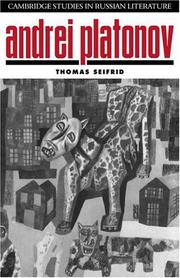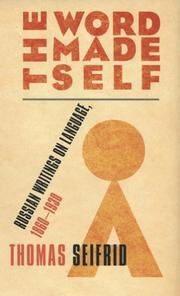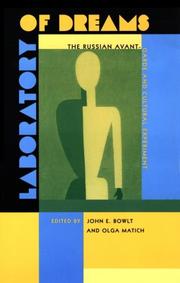| Listing 1 - 10 of 10 |
Sort by
|

ISBN: 052140522X 052102675X 0511519648 9780521405225 9780511519642 9780521026758 Year: 1992 Volume: vol *6 Publisher: Cambridge: Cambridge university press,
Abstract | Keywords | Export | Availability | Bookmark
 Loading...
Loading...Choose an application
- Reference Manager
- EndNote
- RefWorks (Direct export to RefWorks)
The Soviet writer Andrei Platonov (1899 1951) belongs to a Russian philosophical tradition that includes such figures as Vladimir Solov’ev, Mikhail Bakhtin and Boris Pasternak. This study investigates the interrelation of themes, imagery and the use of language in his prose. Thomas Seifrid shows how Platonov was particularly influenced by Russian utopian thought of the late nineteenth and early twentieth centuries, and how his world view was also shaped by its implicit dialogue with the ‘official’ Soviet philosophy of Marxism-Leninism, and later with Stalinist utopianism. He discusses how in Platonov’s masterpieces of the late 1920s and early 1930s linguistic parody comes together with existential angst and dystopian doubts about the course of Soviet history. The study concludes with consideration of the works Platonov wrote from 1934 to 1951, in the age of socialist realism. In these, he manoeuvred to preserve some of the essentials of his earlier world view and verbal manner while fusing them to the literary formulae that were expected of him.
Filosofie in de literatuur --- Philosophie dans la littérature --- Philosophy in literature --- Réalisme socialiste dans la littérature --- Socialist realism in literature --- Socialistische realisme in de literatuur --- Philosophy in literature. --- Socialist realism in literature. --- Platonov, Andrei Platonovich, --- Criticism and interpretation --- Platonov, Andreĭ Platonovich, --- Philosophie dans la littérature --- Réalisme socialiste dans la littérature --- Platonov, Andreĭ Platonovich, --- Platonov, Andreï Platonovich --- Platonov, Andre i Platonovich, 1899-1951 - Criticism and interpretation. --- Arts and Humanities --- Literature --- Platonov, Andreĭ Platonovich, - 1899-1951 - Criticism and interpretation --- Criticism and interpretation. --- Платонов, Андрей Платонович, --- Płatonow, Andriej, --- Platonow, Andrej, --- Платонов, Андрей, --- Platonov, Andreĭ, --- Климентов, Андрей Платонович, --- Klimentov, Andreĭ Platonovich, --- Платонов, А. --- Platonov, A. --- Platonov, Andrej, --- Platonov, Andrey, --- פלטונוב, אנדריי, --- Platonov, Andreĭ Platonovich --- Platonov, Andreĭ Platonovich, - 1899-1951
Book
ISBN: 1618119370 Year: 2009 Publisher: Academic Studies Press
Abstract | Keywords | Export | Availability | Bookmark
 Loading...
Loading...Choose an application
- Reference Manager
- EndNote
- RefWorks (Direct export to RefWorks)
Book
Year: 2009 Publisher: Boston : Academic Studies Press,
Abstract | Keywords | Export | Availability | Bookmark
 Loading...
Loading...Choose an application
- Reference Manager
- EndNote
- RefWorks (Direct export to RefWorks)
Written at the height of Stalin's first "five-year plan" for the industrialization of Soviet Russia and the parallel campaign to collectivize Soviet agriculture, Andrei Platonov's The Foundation Pit registers a dissonant mixture of utopian longings and despair. Furthermore, it provides essential background to Platonov's parody of the mainstream Soviet "production" novel, which is widely recognized as one of the masterpieces of twentieth-century Russian prose. In addition to an overview of the work's key themes, it discusses their place within Platonov's oeuvre as a whole, his troubled relations with literary officialdom, the work's ideological and political background, and key critical responses since the work's first publication in the West in 1973.
Politics and literature --- History --- Platonov, Andreĭ Platonovich, --- Criticism and interpretation.
Book
Year: 2009 Publisher: Boston : Academic Studies Press,
Abstract | Keywords | Export | Availability | Bookmark
 Loading...
Loading...Choose an application
- Reference Manager
- EndNote
- RefWorks (Direct export to RefWorks)
Written at the height of Stalin's first "five-year plan" for the industrialization of Soviet Russia and the parallel campaign to collectivize Soviet agriculture, Andrei Platonov's The Foundation Pit registers a dissonant mixture of utopian longings and despair. Furthermore, it provides essential background to Platonov's parody of the mainstream Soviet "production" novel, which is widely recognized as one of the masterpieces of twentieth-century Russian prose. In addition to an overview of the work's key themes, it discusses their place within Platonov's oeuvre as a whole, his troubled relations with literary officialdom, the work's ideological and political background, and key critical responses since the work's first publication in the West in 1973.
Politics and literature --- History --- Platonov, Andreĭ Platonovich, --- Criticism and interpretation.
Book
ISBN: 9781487551803 Year: 2024 Publisher: London : University of Toronto Press,
Abstract | Keywords | Export | Availability | Bookmark
 Loading...
Loading...Choose an application
- Reference Manager
- EndNote
- RefWorks (Direct export to RefWorks)
"Staging the Absolute argues that an array of practices and beliefs came together to define an essential aspect of Russian and Soviet culture in the twentieth century: the persistent desire to interrupt--or disrupt--history. Drawing on sources that define the nature of public rituals, the book reveals the pervasive presence of the impulse to impede history in Russia's modern era and the realization of the idea in the form of the Stalinist show trials of the 1930s. Thomas Seifrid analyses Soviet festivals, public displays of agitational propaganda, and urban planning, together with such modernist precursors as fin-de-siècle and early twentieth-century projects for reviving the theatre, modernist adaptations of puppet theatre, the Faust legend and its vogue in early twentieth-century Russia, and the nineteenth-century panorama. The book reveals that what binds these otherwise disparate phenomena together is a shared impatience with history and a corresponding desire to appropriate urban space. Illuminating the deeper meanings in these revived archaic forms, Staging the Absolute shows how pervasive the interest in disrupting history was in the Russian modern era."
City planning --- Festivals --- Theater and society --- Russian literature --- History and criticism. --- Soviet Union --- Symbolic representation.
Book
Year: 2009 Publisher: Boston : Academic Studies Press,
Abstract | Keywords | Export | Availability | Bookmark
 Loading...
Loading...Choose an application
- Reference Manager
- EndNote
- RefWorks (Direct export to RefWorks)
Written at the height of Stalin's first "five-year plan" for the industrialization of Soviet Russia and the parallel campaign to collectivize Soviet agriculture, Andrei Platonov's The Foundation Pit registers a dissonant mixture of utopian longings and despair. Furthermore, it provides essential background to Platonov's parody of the mainstream Soviet "production" novel, which is widely recognized as one of the masterpieces of twentieth-century Russian prose. In addition to an overview of the work's key themes, it discusses their place within Platonov's oeuvre as a whole, his troubled relations with literary officialdom, the work's ideological and political background, and key critical responses since the work's first publication in the West in 1973.

ISBN: 1501718282 9781501718281 0801443164 9780801443169 Year: 2018 Publisher: Ithaca, NY
Abstract | Keywords | Export | Availability | Bookmark
 Loading...
Loading...Choose an application
- Reference Manager
- EndNote
- RefWorks (Direct export to RefWorks)
When Osip Mandelstam wrote that the Russian word was "sentient and breathing flesh," he voiced one of the most powerful themes in his culture. In The Word Made Self, Thomas Seifrid explores this Russian fascination with the power of the word as expressed in the work of philosophers, theologians, and artists of the Silver Age and early Soviet period. He shows that their diverse works (poems, novels, philosophical and religious tracts) share an attempt to articulate "a model of selfhood within the phenomenon of language." The thinkers included in this book-among them Pavel Florenskii, Roman Jakobson, Aleksei Losev, and Gustav Shpet-frequently responded to the work of contemporary European philosophers even as they drew upon and revitalized powerful elements of early Russian religious thought. On Seifrid's view, this highly original body of writing about language was the essential context for the development of Russian Futurism, Formalism, and the work of Mikhail Bakhtin and the Soviet structuralists-movements and ideas whose influence has extended far beyond Russia and long past their years of efflorescence. This book will have a lasting impact among readers who will be fascinated to discover the richness of this long-suppressed chapter in the history of Russian culture.
Philosophy, Russian --- Language and languages --- History. --- Philosophy. --- Philosophy --- History --- Philosophy [Russian ]
Book
ISBN: 1618110012 1934843571 9781618110015 9781618116970 1618116975 1934843083 9781934843086 9781934843574 Year: 2009 Publisher: Boston : Academic Studies Press,
Abstract | Keywords | Export | Availability | Bookmark
 Loading...
Loading...Choose an application
- Reference Manager
- EndNote
- RefWorks (Direct export to RefWorks)
Written at the height of Stalin's first "five-year plan" for the industrialization of Soviet Russia and the parallel campaign to collectivize Soviet agriculture, Andrei Platonov's The Foundation Pit registers a dissonant mixture of utopian longings and despair. Furthermore, it provides essential background to Platonov's parody of the mainstream Soviet "production" novel, which is widely recognized as one of the masterpieces of twentieth-century Russian prose. In addition to an overview of the work's key themes, it discusses their place within Platonov's oeuvre as a whole, his troubled relations with literary officialdom, the work's ideological and political background, and key critical responses since the work's first publication in the West in 1973.
Politics and literature --- History --- Platonov, Andreĭ Platonovich, --- Criticism and interpretation. --- Literature --- Literature and politics --- Political aspects --- Платонов, Андрей Платонович, --- Płatonow, Andriej, --- Platonow, Andrej, --- Платонов, Андрей, --- Platonov, Andreĭ, --- Климентов, Андрей Платонович, --- Klimentov, Andreĭ Platonovich, --- Платонов, А. --- Platonov, A. --- Platonov, Andrej, --- Platonov, Andrey, --- פלטונוב, אנדריי, --- Platonov, Andreĭ Platonovich


ISBN: 0804725535 0804736529 Year: 1996 Publisher: Stanford Stanford University Press
Abstract | Keywords | Export | Availability | Bookmark
 Loading...
Loading...Choose an application
- Reference Manager
- EndNote
- RefWorks (Direct export to RefWorks)
Russia --- Soviet Union --- Russie --- URSS --- Civilization --- Civilization. --- Intellectual life --- Civilisation --- Vie intellectuelle
Book

ISBN: 1618117211 9781618117212 9781618117205 1618117203 1618117785 9781618117786 Year: 2018 Publisher: Boston, MA
Abstract | Keywords | Export | Availability | Bookmark
 Loading...
Loading...Choose an application
- Reference Manager
- EndNote
- RefWorks (Direct export to RefWorks)
This bilingual collection in honor of the great scholar and writer Alexander Zholkovsky brings together new work from forty-four leading scholars in nine countries. Like Zholkovsky's oeuvre, this volume covers a broad range of subjects and employs an array of approaches. Topics range from Russian syntax to Peter the Great, literary theory, and Russian film. The articles are rooted in computational analysis, literary memoir, formal analysis, cultural history, and a host of other methodological and discursive modes. This collection provides not only a fitting tribute to one of the most fascinating figures of Russian letters but also a remarkable picture of the shape of Russian literary scholarship today.
Russian literature --- Motion pictures --- Cinema --- Feature films --- Films --- Movies --- Moving-pictures --- Audio-visual materials --- Mass media --- Performing arts --- History and criticism. --- History and criticism --- Zholkovskiĭ, A. K. --- Жолковский, А. К. --- Жолковский, Александр Константинович --- Zholkovskiĭ, Aleksandr Konstantinovich --- Zholkovsky, Alexander K. --- Zholkovskij, A. K. --- Criticism and interpretation. --- Avant-Garde. --- Modernism. --- Poetics. --- Russian culture. --- Russian literature. --- Structuralism.
| Listing 1 - 10 of 10 |
Sort by
|

 Search
Search Feedback
Feedback About UniCat
About UniCat  Help
Help News
News